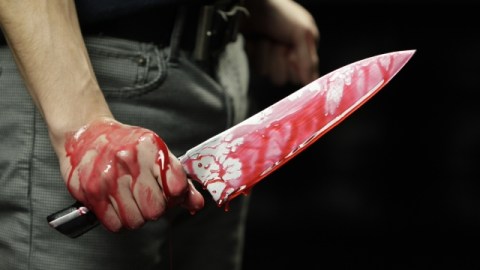Years of the Knife – The Stabbing Culture in East Asia

TAIPEI/TOKYO – What is this East-Asian obsession with blades and stabbings that has perverted these otherwise harmonious quarters of Confucian legacy?
The knife seems to be the preferred device of killing frenzies in those countries that restrict or ban firearms. Shooting fall-outs are rare from Beijing to Hong Kong, from Shanghai to Seoul, from Hong Kong to Tokyo. So, the hoodlums go out instead with kitchen blades, cleavers, and jackknives.
The latest killings happened just today at around 4 pm in a Taipei subway station. A 21-years old man allegedly boarded a crowded section of the train and knifed down at least 25 passengers, four of whom died in their blood. A relative in law of your author was struck three times –in her defense arm, her back, and, when she escaped, her fleeting ankle. She is in hospital, in stable condition, but still under shock. So is the entire island of Taiwan. Such random eruptions of violence are relatively rare in orderly Taipei, they say. Now they know it can happen any time.
ALSO ON DRAGONS AND PANDAS Beware of ‘Universal Ethics’
China
Stabbings are far more common in mainland China, although not always as widely reported as the Henan school knife attack in 2012 that witnessed 23 (barely out of kindergarten) kids with severe stab wounds. You can watch the video here (warning: it’s gruesome!). The perpetrator was clinical insane, or so he confessed. Henan authorities promptly advised all schools to hire security guards, which is –as everyone familiar with China knows –a gargantuan task of impossible dimensions –Henan alone administers 100 million citizens.
There are many more stabbings to speak of, in fact, just toady there occurred another knife massacre in the city of Lushan of Henan province. Seven neighbors lost their lives to a lunatic. Small villages are in particular vulnerable. Cutlery is sold left and right in the streets.
And then there was the Kunming Mass Stabbing in March 2014. It was so brutal and violent in scope and execution –the state denounced it as terrorist attack. Over 130 people were slashed, hacked, and ended, leaving 29 dead. The stabbers, four of them shot on the scene, came from Xinjiang, a region where –because of ethnical and political tensions- stabbings occur frequently.
RELATED China has a Serial Killers Problem (Danwei.com)
Knives are often worn in public in Xinjiang and Tibetan, and are in fact among the most popular souvenirs. Yet, of course, stabbings are most media-effective if they occur in public places in the big cities. Just weeks after the Kunming massacre, for example, six people were gruesomely stabbed down at Guangzhou Railway Station in Guangdong.
Blades are typically the preferred fetish of death of serial killers, although the one or other shovel, hammer, or axe is frequently thrown in. Your author still recalls the time at Fudan University of Shanghai in summer 2003 when the killing spree of Yang Zhiya had kept the region in fear. He had early childhood dreams of murder and rape, his family concurred; and in 2000 the thug set out on his bike, smashing, chopping, and annihilating entire families on his trip. (He was executed in 2014, just three month after his arrest, a fast-track to ease the pain of the nation.)
Korea
Korea is constantly on knife-alert, too. True, stabbing rampages such as the 2008 Seoul incident are still uncommon. Yet, the country is under constant terror by frequent so-called rush-hour knifings (or crowd-stabbing, if you will).
ALSO ON DRAGONS AND PANDAS People with a death-wish
Japan
Tokyo, as well, had its unfair share of mayhem. The Japanese, stricken already by the highest suicide rate anywhere in this galaxy, and smitten by frequent earthquakes and tsunamis, are forever haunted by images of Tomohiro Kato, a 25-year-old ‘otaku’ (loosely translated as geek or nerd) drove a truck into a crowd at Tokyo’s busy Akihabara district (known as Electronic Town, popular with young people and tourists). After he steamrolled the pedestrians, he jumped out of the vehicle and stabbed some more. Seven people died. The list of knife crimes in Japan –even if the Yakuza is excluded- is wickedly long.
The imagery of knife-wielding “losers” –mostly young, male, underemployed, mentally ill- haunts East Asian citizens during their rush-hours, partly because there are potentially so many of them.
As one psychologist at Seoul National University once quipped it:
“Pent-up frustration and rage in a highly competitive society have caused the recent attacks against indiscriminate victims, and this was compounded by copy-cat behavior.”
If this is a correct observation, and we have reason to think it is, then governments have to address the causes of this spreading social sickness, and do so quickly.
It is very wise of East Asian authorities to categorically outlaw the possession of guns and rifles. But how do they prevent dangerous men from visiting a kitchen.
Image credit: Burlingham/Shutterstock
You can follow me on Twitter, my Website, or my other Blog. See you next time around!




